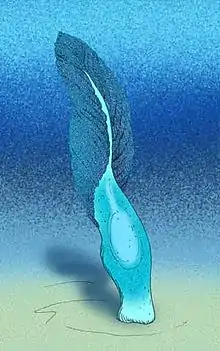Stromatoveris
Stromatoveris is a genus of fossil organism from Chengjiang deposits of Yunnan that was originally aligned with the fossil Charnia (strictly, the Charniomorpha) from the Ediacara biota.[1] However, such an affinity is developmentally implausible and S. psygmoglena is now thought to be either a sessile basal ctenophore, or a sessile organism closely related to ctenophores.[2] Nevertheless, a 2018 phylogenetic analysis by Jennifer Hoyal Cuthill and Jian Han indicated that Stromatoveris was a member of Animalia and closely related to ediacarans frond-like forms.[3][4]
| Stromatoveris | |
|---|---|
 | |
| artist's reconstruction | |
| Scientific classification | |
| Kingdom: | Animalia |
| Phylum: | Ctenophora (?) |
| Genus: | †Stromatoveris |
| Species: | †S. psygmoglena |
| Binomial name | |
| †Stromatoveris psygmoglena Shu et al. 2006 | |
References
- Shu, D. -G.; Morris, S.; Han, J.; Li, Y.; Zhang, X.; Hua, H.; Zhang, Z.; Liu, J.; Guo, J.; Yao, Y.; Yasui, K. (2006). "Lower Cambrian Vendobionts from China and Early Diploblast Evolution". Science. 312 (5774): 731–734. Bibcode:2006Sci...312..731S. doi:10.1126/science.1124565. PMID 16675697.
- Antcliffe, J. B.; Brasier, M. D. (2007). "Charnia and sea pens are poles apart". Journal of the Geological Society. 164: 49–51. Bibcode:2007JGSoc.164...49A. doi:10.1144/0016-76492006-080.
- Hoyal Cuthill, Jennifer H.; Han, Jian (2018). "Cambrian petalonamid Stromatoveris phylogenetically links Ediacaran biota to later animals" (PDF). Palaeontology. 61 (6): 813–823. doi:10.1111/pala.12393.
- Hoyal Cuthill, Jennifer (10 August 2018). "Scientists take a closer look at Earth's first animals". Phys.org. Retrieved 10 August 2018.
This article is issued from Wikipedia. The text is licensed under Creative Commons - Attribution - Sharealike. Additional terms may apply for the media files.